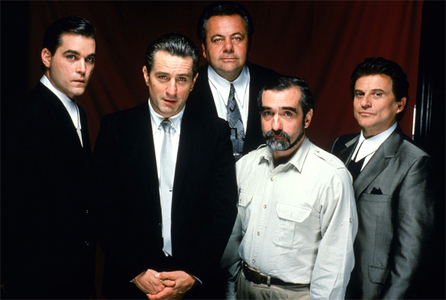The legacy of Martin Scorsese’s 1990 film Goodfellas can’t be oversold. The film, based on the book Wiseguy by Nicholas Pileggi who also co-wrote the screenplay, was something of a revival for the legendary director. After the double hit of classics Raging Bull, and King of Comedy, at the start of the eighties, Scorsese struggled to find his voice with After Hours, The Colour of Money, and his passion project The Last Temptation of Christ, all great films but lacked the spark of his late seventies heyday. As a response he went back to what he knew, which was the ground level New York gangsters, the very subject of his breakthrough hit Mean Streets, except this time he was a master filmmaker instead of an apprentice. Goodfellas tells the story of wise guy Henry Hill, played by Ray Liotta in a career best performance. From the late fifties to the eighties we see Henry’s rise and fall, meeting some of cinemas best loved, and feared characters along the way. Often mentioned in the same breath as The Godfather, Goodfellas is a much more anarchic film, with ad-libbing, and improvisation within scenes cultivating the idea that the set was a well-run mad house. Instead of the wealth and excess of power shown in Francis Ford Coppola’s masterpiece, Goodfellas goes one better, showing the ground level violence, and respect fuelled workings of a neighbourhood full of crooks in more detail.  This isn’t just Henry’s story though, Scorsese’s take normal filmmaking conventions and shoots them in the head. Instead of a traditional narrative we get tow voice-overs: one being Henry’s, and the other his wife Karen, played by Lorraine Bracco, proving that it’s her story too. Add to that Joe Pesci’s Oscar winning turn as Tommy Devito, a volatile criminal whose violent tendencies propel the plot into comically dark territory. Rallying them altogether is Scorsese’s premier collaborator Robert De Niro as James “Jimmy the Gent” Conway, a gangster, and expert thief who represents the embodiment of Henry and Tommy’s different natures. He’s the guy that wants the bad guys to win at the end of the movies.
This isn’t just Henry’s story though, Scorsese’s take normal filmmaking conventions and shoots them in the head. Instead of a traditional narrative we get tow voice-overs: one being Henry’s, and the other his wife Karen, played by Lorraine Bracco, proving that it’s her story too. Add to that Joe Pesci’s Oscar winning turn as Tommy Devito, a volatile criminal whose violent tendencies propel the plot into comically dark territory. Rallying them altogether is Scorsese’s premier collaborator Robert De Niro as James “Jimmy the Gent” Conway, a gangster, and expert thief who represents the embodiment of Henry and Tommy’s different natures. He’s the guy that wants the bad guys to win at the end of the movies.  It’s not just the cast that make Goodfellas soar, it’s Scorsese himself: we all know about the tracking shot, but he also crafts Henry, and Karen’s story into a hazy montage of good times with era appropriate music, it’s when the music stops that things go to hell in a hand basket. Without Goodfellas Martin Scorsese wouldn’t be the living legend he is today, a chronicler of the dark side of the American dream, his cast of misfit criminals are always more compelling than those boring good guys.
It’s not just the cast that make Goodfellas soar, it’s Scorsese himself: we all know about the tracking shot, but he also crafts Henry, and Karen’s story into a hazy montage of good times with era appropriate music, it’s when the music stops that things go to hell in a hand basket. Without Goodfellas Martin Scorsese wouldn’t be the living legend he is today, a chronicler of the dark side of the American dream, his cast of misfit criminals are always more compelling than those boring good guys.

 This isn’t just Henry’s story though, Scorsese’s take normal filmmaking conventions and shoots them in the head. Instead of a traditional narrative we get tow voice-overs: one being Henry’s, and the other his wife Karen, played by Lorraine Bracco, proving that it’s her story too. Add to that Joe Pesci’s Oscar winning turn as Tommy Devito, a volatile criminal whose violent tendencies propel the plot into comically dark territory. Rallying them altogether is Scorsese’s premier collaborator Robert De Niro as James “Jimmy the Gent” Conway, a gangster, and expert thief who represents the embodiment of Henry and Tommy’s different natures. He’s the guy that wants the bad guys to win at the end of the movies.
This isn’t just Henry’s story though, Scorsese’s take normal filmmaking conventions and shoots them in the head. Instead of a traditional narrative we get tow voice-overs: one being Henry’s, and the other his wife Karen, played by Lorraine Bracco, proving that it’s her story too. Add to that Joe Pesci’s Oscar winning turn as Tommy Devito, a volatile criminal whose violent tendencies propel the plot into comically dark territory. Rallying them altogether is Scorsese’s premier collaborator Robert De Niro as James “Jimmy the Gent” Conway, a gangster, and expert thief who represents the embodiment of Henry and Tommy’s different natures. He’s the guy that wants the bad guys to win at the end of the movies.  It’s not just the cast that make Goodfellas soar, it’s Scorsese himself: we all know about the tracking shot, but he also crafts Henry, and Karen’s story into a hazy montage of good times with era appropriate music, it’s when the music stops that things go to hell in a hand basket. Without Goodfellas Martin Scorsese wouldn’t be the living legend he is today, a chronicler of the dark side of the American dream, his cast of misfit criminals are always more compelling than those boring good guys.
It’s not just the cast that make Goodfellas soar, it’s Scorsese himself: we all know about the tracking shot, but he also crafts Henry, and Karen’s story into a hazy montage of good times with era appropriate music, it’s when the music stops that things go to hell in a hand basket. Without Goodfellas Martin Scorsese wouldn’t be the living legend he is today, a chronicler of the dark side of the American dream, his cast of misfit criminals are always more compelling than those boring good guys. 




